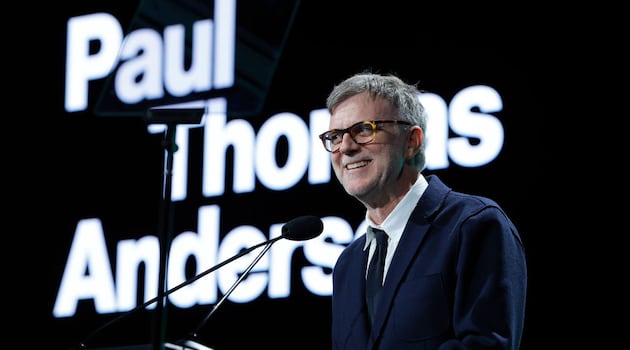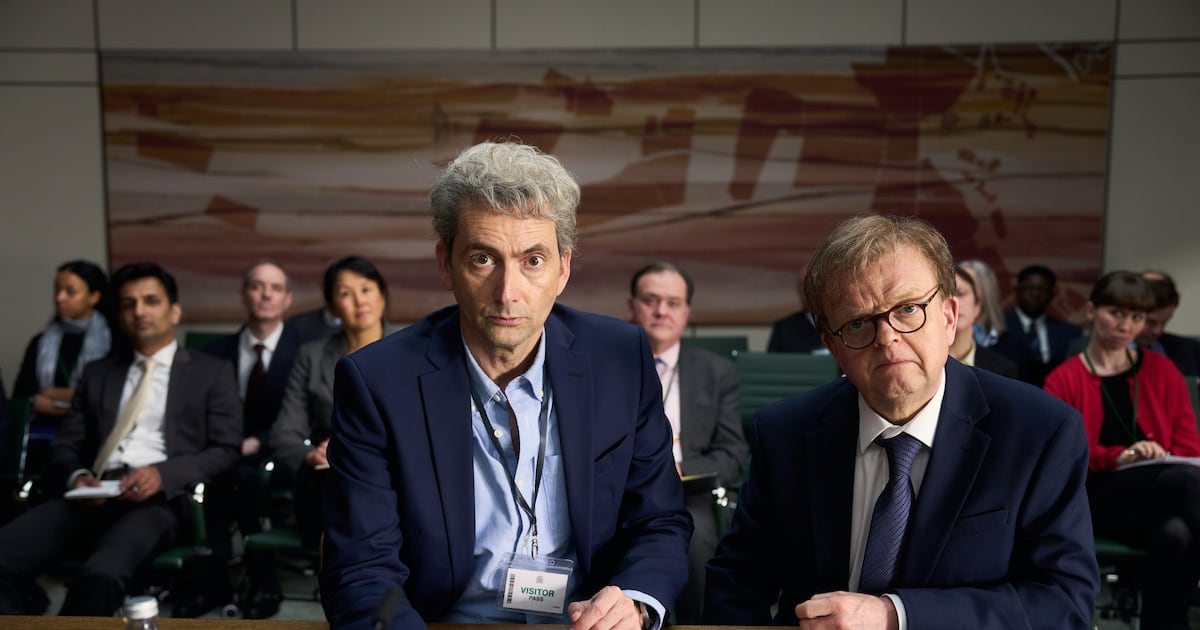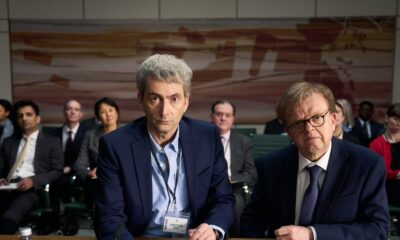Culture
Des Cahill sounds wistful as Mary Wilson and Áine Lawlor leave Morning Ireland

Read more on post.
On the surface it seems like a normal show, but an unusual atmosphere suffuses Wednesday’s Morning Ireland (RTÉ Radio 1, weekdays): a party atmosphere. Or a good-natured social gathering, at any rate, as its long-serving presenters Mary Wilson and Áine Lawlor are surprised by the unexpected arrival of the sportscaster Des Cahill.
“Forgive me interrupting,” Cahill says, “but I want to take a couple of minutes to acknowledge two wonderful broadcasters who today are presenting Morning Ireland for the last time.”
Yet more RTÉ departures? Coming alongside Joe Duffy’s retirement and Claire Byrne’s imminent defection to Newstalk, Radio 1 staff could be forgiven for growing weary of office whip-arounds for exiting presenters.
[ ‘It’s been a privilege’ – Mary Wilson and Áine Lawlor host final Morning IrelandOpens in new window ]
But there’s no mistaking the uncharacteristically celebratory air in the studio. Paying tribute to Wilson, who is retiring, and Lawlor, who will continue working on TV, Cahill sounds more moved than his colleagues: “I’ll have no one else to gossip with,” he wistfully remarks to Lawlor.
Wilson breaks from her stern on-air persona to express sincere gratitude for her career, from court correspondent to presenter of Radio 1’s Drivetime. “You have such great fun as a journalist,” she says, a carefree recollection that may surprise those politicians mauled by her tenacious interrogation style.
Nor is it the only send-off of the day. Wilson and Lawlor have already bid farewell to the business correspondent Petula Martyn (off to become RTÉ’s midwestern correspondent), praising her “cheerful presence”, a welcome quality on a show that so often brings bleak tidings.
Overall, it’s an atypically upbeat edition of the flagship news programme, which even Lawlor concedes is sometimes a slog. “Thank you to people who do tune in every day, because it can be grim.”
The feelgood mood is so pervasive that it extends to news stories. Much breezy coverage is given to RTÉ’s hit reality game show The Traitors Ireland, which might seem a bit excessive but perhaps excusable, optimism being a scarce commodity around Montrose in recent times.
It briefly seems that the good vibes might even extend to the presidential hopeful Maria Steen, as the Independent Senator Aubrey McCarthy tells Wilson he will sign the conservative campaigner’s nomination, bringing her tantalisingly close to the 20 Oireachtas votes required for candidacy. “The decision itself is not an endorsement,” the Senator stresses.
It ends up not mattering, with Steen’s bid falling short later that day, but McCarthy’s interview adds a frisson of real-time political drama to proceedings.
So too does the appearance on Tuesday’s programme by the Independent presidential candidate Catherine Connolly, though she has little reason to cheer after her bruising encounter with (the non-retiring) Audrey Carville.
Following her comments on Talkback, on BBC Radio Ulster, that Hamas is “part of the fabric of the Palestinian people”, Connolly attempts to clarify her position, condemning the October 7th attacks on Israel as “absolutely unacceptable”, while adding that “both sides have committed war crimes”.
Carville relentlessly presses her guest on the issue. The Galway West TD, while sounding sincerely idealistic, struggles to set out her policies. She also sounds in danger of losing her voice at one stage – an unfortunate occurrence that is never the mark of a confident radio performance.
Either way, Carville’s dogged questioning emphasises that, the departure of stalwarts such as Wilson and Lawlor notwithstanding, it’s business as usual on Morning Ireland.
It’s a measure of the churn at Radio 1 that Ray D’Arcy (RTÉ Radio 1, weekdays) is now the elder statesman of the station’s daytime line-up, having occupied his mid-afternoon slot for a decade. And although his show may be too unbalanced in format and skittish in content to warrant venerable status, D’Arcy has been hosting some strikingly candid interviews between the chatty monologues and chirpy quizzes.
Speaking to the American singer Steve Earle on Tuesday, for instance, D’Arcy starts out pitching softball questions about his guest’s induction into Nashville’s country-music mecca, the Grand Ole Opry. Gradually, however, talk turns to more personal territory: Earle describes how raising a teenage son with autism limits his touring schedule, while the host asks, awkwardly but pertinently, about the boy’s future after his 70-year-old father dies, whenever that may be.
As if this isn’t stark enough, the singer discusses the addiction issues that saw him incarcerated in the 1990s, as well as the drug-related death of his oldest son, the singer-songwriter John Townes Earle, describing his fentanyl-laced cocaine overdose as murder.
Despite this, things never sound tense, with Earle engaging with D’Arcy’s questions. Still, both men unsurprisingly sound happier when they move on to the singer’s sojourns in Ireland and his resulting anthem, Galway Girl.
An equally raw tone prevails on Wednesday, when D’Arcy hears the former boxer Barry McGuigan describe how the suicide of his brother, Dermot, motivated his association with the men’s-health charity Movember. “I was destroyed and still am,” he says of the tragedy, more than 30 years ago.
As they talk McGuigan responds to his host’s diplomatic but deliberate probing with an honesty that’s almost painful, his voice cracking when he recalls his late daughter, the actor Nika McGuigan, who died of cancer in 2019. “She was my child, and I lost her and I’ll never get her back,” he says. “And that’s incredibly difficult to live with.”
D’Arcy’s curiosity about such loss isn’t that of a rubbernecker; rather, he speaks of his own recent bereavement. “I lost my mother recently,” he says. “It was the first time I felt real grief, the physical effects of grief.”
The openness of both guest and host gives their conversation an emotional charge not always associated with afternoon chat shows, but D’Arcy is at his most effective when dealing with issues close to him. It’s not all fun and games.
Moment of the week
Back for a third series, For the Record (RTÉ Gold, Sunday) sees Pat O’Mahony continue his shaggily entertaining trawl through the music collections of various notables. The latest show, on RTÉ’s digital oldies station, has O’Mahony sifting through records belonging not only to the composer Peadar Ó Riada but also to his guest’s late father, Seán Ó Riada.
As they listen to folk, classical and even indie recordings of varying quality – one warped LP is suitably crackly – Ó Riada is a low-key but sparky foil to the host, whose deceptively easy-going style masks his deftness at gently steering the conversation.
As well as recalling his legendary composer father, Ó Riada mixes definite opinions – “There’s nothing sacred in music, except for those who have ghettoised versions of where everything should be” – with a dry sense of humour. “What’s your storage system?” O’Mahony asks at one stage. “Wherever there’s space,” the chuckling reply comes. Collectors everywhere will know the dilemma.
Culture
The Paul Thomas Anderson Movie Quiz: Who is not on the Boogie Nights soundtrack?

Read more on post.
Culture
Kneecap band member’s London court hearing moved to other side of city after flooding

Read more on post.
A London hearing on Friday in a case involving Kneecap’s Liam Óg Ó hAnnaidh has been moved from Westminster Magistrates Court to another venue 21km (13 miles) away.
The UK’s Ministry of Justice (MoJ) has confirmed to The Irish Times the hearing in the case, in which he is accused of showing support for a terrorist organisation, has been moved to Woolwich Crown Court on the outer fringes of east London.
Westminster Magistrates Court was closed on Thursday after a water main burst and flooded the area.
The MoJ said it did not yet know if the court would reopen on Friday, but added the Kneecap rapper’s case had definitely been moved to the courthouse of Woolwich Crown Court for a 10am hearing.
Earlier on Thursday, London’s Metropolitan Police had banned supporters of Mr Ó hAnnaidh, from congregating at the entrance to Westminster Magistrates Court.
Mr Ó hAnnaidh is due to appear for a ruling on his application to have the case against him thrown out.
He is accused by British authorities of showing support for a proscribed organisation by draping himself in a Hizbullah flag at a gig in London last November.
Judge Paul Goldspring of Westminster Magistrates Court is due to rule whether he has jurisdiction to hear the case – albeit the hearing will now be in Woolwich.
Mr Ó hAnnaidh, who performs as Mo Chara in the Belfast rap trio, has yet to enter a plea in the case but he has publicly indicated that he intends to fight the charge.
At a previous hearing in August, his lawyers argued that the charge against him was issued one day beyond an official deadline. Prosecution lawyers denied this.
The judge has indicated if Mr Ó hAnnaidh’s lawyers are shown to be correct, the case against him will be immediately dismissed on Friday. If the jurisdiction ruling goes against the Irish man, the case will proceed and he will have to enter a plea. If he pleads not guilty, a trial will be set for a later date.
At two previous hearings in the case, hundreds of supporters of Mr Ó hAnnaidh, many waving Irish Tricolours and Palestinian flags, congregated at or near the entrance to Westminster Magistrates Court to hold noisy protests.
On Thursday, police had issued an order restricting supporters of the rapper to a location set back around the corner from the front door of the courthouse.
In a statement on the social media platform X, Kneecap accused the police of making a “calculated political decision”.
“This police action is designed to try and portray support for Kneecap as somehow troublesome,” said the band. Police said the order was necessary to prevent “serious disorder, damage, disruption, impact or intimidation”.
It is unclear what restrictions the police may put in place for the Woolwich hearing.
Culture
The Hack review: Great story of the British tabloid phone-hacking scandal is let down by wackiness

Read more on post.
There are certain fields in which the UK remains a world leader, and among them is public service drama. That is, scripted television that aspires to something beyond mere entertainment and which, when done properly, turns television into a singular instrument for social commentary.
That point was proved with Mr Bates vs the Post Office, about the scandalous treatment of sub-postmasters in the UK and, all over again, with Adolescence on Netflix. Adolescence was far from perfect – its portrayal of the average 13-year-old boy so wide of the mark you had to wonder if anyone involved had ever met an actual teenager. Still, it was insightful about the damage done to young men by toxic manosphere influencers and started a conversation about the dangerous garbage to which children are too often given access.
Now, Adolescence co-writer Jack Thorne has turned his attention to the cesspit that was the British tabloid industry by retelling the News of the World (NoW) phone-hacking scandal with The Hack (UTV, Wednesday). It stars David Tennant, who plays world-weary Guardian investigative journalist Nick Davies, the reporter who put together the story of the NoW hacking scandal over many painstaking years.
Tennant was among the dozens of celebrities and ordinary members of the public whose phone messages were illegally accessed by unscrupulous hackers, which perhaps explains the fervour he brings to the performance.
Journalists can be counted on to swoon over a TV series that paints their profession in even a vaguely positive light, and Davies is undoubtedly the hero of the piece. He has the ideal foil in Toby Jones as Guardian editor Alan Rusbridger, while Robert Carlyle pops up in part two as a constable investigating the disappearance of a private detective – a thread that eventually dovetails with Davies’s investigations.
It’s a great story, but, like Adolescence, The Hack has an unhelpful fixation on novelty. In the Netflix show, the decision to film each episode in a single take was show-off-y and distracting. The same can be said of the streak of surrealism that runs through The Hack, which features animated backgrounds, such as a Tube ad that comes to life, and moving posters (including one that assumes the likeness of NoW proprietor Rupert Murdoch). You can see the ambition – to capture Davies’ paranoia and frustration. But it brings an edge of wackiness to a tale more than capable of standing on its own feet.
-
Culture3 days ago
Taylor Swift’s new cinema outing generates more than €12million in just 24 hours
-
Politics3 days ago
European Parliament snubs Orbán with vote to shield Italian MEP from Hungarian arrest
-
Health4 days ago
EU renews support for WHO’s Universal Health Coverage Partnership
-
Culture3 weeks ago
Life, loss, fame & family – the IFI Documentary Festival in focus
-
Environment6 days ago
Key oceans treaty crosses threshold to come into force
-
Culture3 days ago
Twilight at 20: the many afterlives of Stephenie Meyer’s vampires
-
Culture2 months ago
Fatal, flashy and indecent – the movies of Adrian Lyne revisited
-
Culture1 week ago
Farewell, Sundance – how Robert Redford changed cinema forever














































